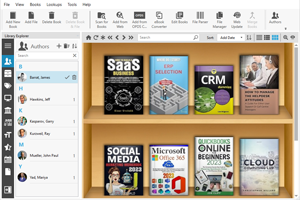4 books on Agricultural software [PDF]
Updated: December 21, 2023 | 21 |
Books on agricultural software are invaluable resources for Agricultural SaaS startups seeking to transform the farming industry through technology. These publications provide in-depth knowledge about the unique challenges and opportunities in agriculture, offering insights into crop management, precision agriculture, supply chain optimization, and data-driven decision-making. By covering topics such as farm management software, IoT applications, and sustainable agriculture, these books equip startups with the understanding required to develop innovative software solutions that address the specific needs of farmers, agribusinesses, and the wider agricultural community. They often feature real-world case studies and best practices, highlighting successful agricultural software implementations and potential obstacles, offering valuable lessons that can guide startups in creating software tools that enhance productivity, sustainability, and profitability in the agricultural sector.
1. Encyclopedia of Digital Agricultural Technologies
2023 by Qin Zhang

The "Encyclopedia of Digital Agricultural Technologies" delves into the burgeoning field of digital agriculture, a modern farming concept centered on utilizing Engineering, Information, and Communication Technologies (EICT) to enhance overall farming efficiency. The aim is to boost agricultural production, elevate product quantity and quality, and optimize human labor and natural resource consumption. This comprehensive encyclopedia serves as a repository of knowledge, covering a multitude of subjects and aspects related to EICT for digital agriculture. Organized alphabetically by article titles, the entries are designed to provide insights into various facets of digital agriculture. Leveraging the Live Update capability of the Springer Major Reference Works platform, the reference work allows for continuous electronic improvement and revision of its content. The editorial board, consisting of experts in diverse fields such as postharvest technologies, crop production technologies, robotics, automation, precision agriculture, AI, and information technologies, ensures a well-rounded and up-to-date exploration of digital agricultural technologies.
Download PDF
2. Machine Learning and Artificial Intelligence for Agricultural Economics
2021 by Chandrasekar Vuppalapati

"Exploring the intersection of machine learning and artificial intelligence within the realm of agricultural economics, this book is dedicated to extending the advantages of advanced analytics and prognostic capabilities to small-scale farmers globally. Specifically tailored to equip data science and software engineering teams, the volume imparts the necessary skills and tools for leveraging economic models to create essential software functionalities with potential life-saving applications. Focused on full-scale software development, the book introduces fundamental agricultural economic concepts while emphasizing the creation of innovative niche products. Chapters delve into various agricultural economic and AI reference architectures, emphasizing data integration, algorithm development, regression, prognostics model creation, and mathematical optimization. Transforming traditional AI software development paradigms to align with the dynamic landscapes of agriculture and economics, this volume serves as a valuable resource for researchers and students in agricultural economics, data science, engineering, and machine learning, as well as professionals in both public and private sectors."
Download PDF
3. Software Engineering Techniques Applied to Agricultural Systems: An Object-Oriented and UML Approach
2014 by Petraq J. Papajorgji, Panos M. Pardalos

"Applying Software Engineering Techniques to Agricultural Systems: An Object-Oriented and UML Approach" delves into state-of-the-art software engineering methodologies tailored for the enhancement of agricultural software systems, utilizing the object-oriented paradigm and the Unified Modeling Language (UML). The book offers a comprehensive exploration of systematic, step-by-step processes for modeling adaptable agricultural and environmental systems, commencing with a conceptual diagram illustrating system elements and their interconnections. Dynamic and static aspects of the software system are further elucidated through diagrams such as sequential and collaboration diagrams. The second edition introduces noteworthy additions, including a chapter on Object Constraint Language (OCL), a dedicated section on the Model-VIEW-Controller (MVC) design pattern, insights into two Model-Driven Architecture (MDA) based tools – the Virtual Enterprise and Olivia Nova, and an exercises chapter on conceptual modeling. Designed to be highly beneficial for both undergraduate and graduate students, this edition serves as an excellent supplementary textbook for courses encompassing mathematical programming in agriculture, ecology, information technology, agricultural operations research methods, agronomy, soil science, and applied mathematical modeling. Its relevance extends to a broad audience engaged in software development within the agricultural domain and researchers interested in modeling intricate systems. The first edition received acclaim for its clarity and technical soundness, making it a valuable resource for gaining insights into current software development techniques and their practical application in agriculture."
Download PDF
4. Environmental and Agricultural Modelling:: Integrated Approaches for Policy Impact Assessment
2010 by Floor M. Brouwer, Martin van Ittersum

"Integrated Approaches for Policy Impact Assessment in Environmental and Agricultural Modelling" addresses the growing challenge of sustainable agricultural practices and the need to balance multiple functions within the field. The book emphasizes the role of integrated assessment and modelling (IAM) in offering insights into the potential impacts of policy changes. Despite the scarcity of concepts addressing the diverse issues inherent in agriculture, this publication reviews and presents the current state of our understanding, offering practical tools for assessing and predicting alternative agricultural and environmental policy options. The book facilitates analysis across a spectrum of scales, from individual farms to the European Union and global levels, while honing in on key issues at each scale. It also explores the environmental, economic, and social contributions of agricultural systems to sustainable rural development and viability. Furthermore, the book delves into a broad array of factors and agents of change, including climate change, environmental policies, rural development options, the implications of an expanding EU, international competition, and the effects on developing countries."
Download PDF
How to download PDF:
1. Install Google Books Downloader
2. Enter Book ID to the search box and press Enter
3. Click "Download Book" icon and select PDF*
* - note that for yellow books only preview pages are downloaded
1. Encyclopedia of Digital Agricultural Technologies
2023 by Qin Zhang

The "Encyclopedia of Digital Agricultural Technologies" delves into the burgeoning field of digital agriculture, a modern farming concept centered on utilizing Engineering, Information, and Communication Technologies (EICT) to enhance overall farming efficiency. The aim is to boost agricultural production, elevate product quantity and quality, and optimize human labor and natural resource consumption. This comprehensive encyclopedia serves as a repository of knowledge, covering a multitude of subjects and aspects related to EICT for digital agriculture. Organized alphabetically by article titles, the entries are designed to provide insights into various facets of digital agriculture. Leveraging the Live Update capability of the Springer Major Reference Works platform, the reference work allows for continuous electronic improvement and revision of its content. The editorial board, consisting of experts in diverse fields such as postharvest technologies, crop production technologies, robotics, automation, precision agriculture, AI, and information technologies, ensures a well-rounded and up-to-date exploration of digital agricultural technologies.
Download PDF
2. Machine Learning and Artificial Intelligence for Agricultural Economics
2021 by Chandrasekar Vuppalapati

"Exploring the intersection of machine learning and artificial intelligence within the realm of agricultural economics, this book is dedicated to extending the advantages of advanced analytics and prognostic capabilities to small-scale farmers globally. Specifically tailored to equip data science and software engineering teams, the volume imparts the necessary skills and tools for leveraging economic models to create essential software functionalities with potential life-saving applications. Focused on full-scale software development, the book introduces fundamental agricultural economic concepts while emphasizing the creation of innovative niche products. Chapters delve into various agricultural economic and AI reference architectures, emphasizing data integration, algorithm development, regression, prognostics model creation, and mathematical optimization. Transforming traditional AI software development paradigms to align with the dynamic landscapes of agriculture and economics, this volume serves as a valuable resource for researchers and students in agricultural economics, data science, engineering, and machine learning, as well as professionals in both public and private sectors."
Download PDF
3. Software Engineering Techniques Applied to Agricultural Systems: An Object-Oriented and UML Approach
2014 by Petraq J. Papajorgji, Panos M. Pardalos

"Applying Software Engineering Techniques to Agricultural Systems: An Object-Oriented and UML Approach" delves into state-of-the-art software engineering methodologies tailored for the enhancement of agricultural software systems, utilizing the object-oriented paradigm and the Unified Modeling Language (UML). The book offers a comprehensive exploration of systematic, step-by-step processes for modeling adaptable agricultural and environmental systems, commencing with a conceptual diagram illustrating system elements and their interconnections. Dynamic and static aspects of the software system are further elucidated through diagrams such as sequential and collaboration diagrams. The second edition introduces noteworthy additions, including a chapter on Object Constraint Language (OCL), a dedicated section on the Model-VIEW-Controller (MVC) design pattern, insights into two Model-Driven Architecture (MDA) based tools – the Virtual Enterprise and Olivia Nova, and an exercises chapter on conceptual modeling. Designed to be highly beneficial for both undergraduate and graduate students, this edition serves as an excellent supplementary textbook for courses encompassing mathematical programming in agriculture, ecology, information technology, agricultural operations research methods, agronomy, soil science, and applied mathematical modeling. Its relevance extends to a broad audience engaged in software development within the agricultural domain and researchers interested in modeling intricate systems. The first edition received acclaim for its clarity and technical soundness, making it a valuable resource for gaining insights into current software development techniques and their practical application in agriculture."
Download PDF
4. Environmental and Agricultural Modelling:: Integrated Approaches for Policy Impact Assessment
2010 by Floor M. Brouwer, Martin van Ittersum

"Integrated Approaches for Policy Impact Assessment in Environmental and Agricultural Modelling" addresses the growing challenge of sustainable agricultural practices and the need to balance multiple functions within the field. The book emphasizes the role of integrated assessment and modelling (IAM) in offering insights into the potential impacts of policy changes. Despite the scarcity of concepts addressing the diverse issues inherent in agriculture, this publication reviews and presents the current state of our understanding, offering practical tools for assessing and predicting alternative agricultural and environmental policy options. The book facilitates analysis across a spectrum of scales, from individual farms to the European Union and global levels, while honing in on key issues at each scale. It also explores the environmental, economic, and social contributions of agricultural systems to sustainable rural development and viability. Furthermore, the book delves into a broad array of factors and agents of change, including climate change, environmental policies, rural development options, the implications of an expanding EU, international competition, and the effects on developing countries."
Download PDF
How to download PDF:
1. Install Google Books Downloader
2. Enter Book ID to the search box and press Enter
3. Click "Download Book" icon and select PDF*
* - note that for yellow books only preview pages are downloaded


